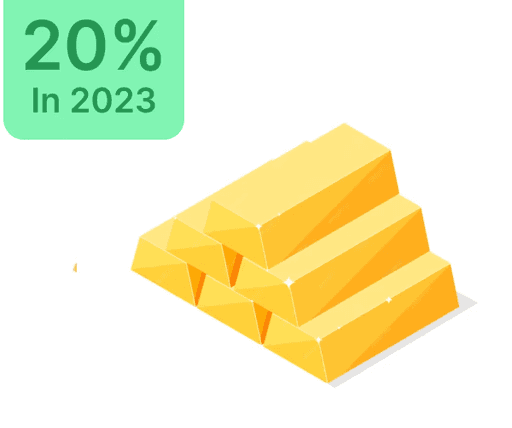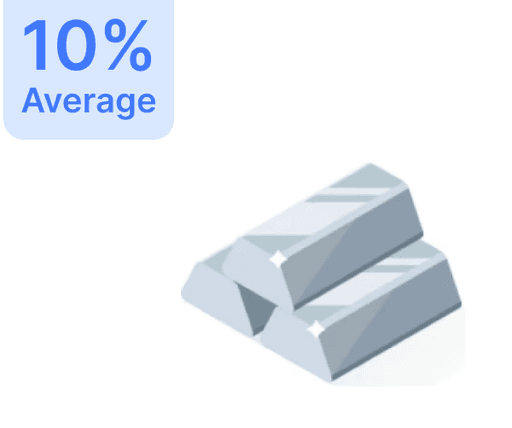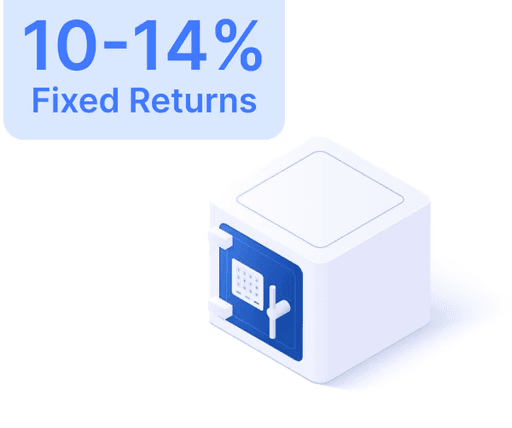
Fixed Deposit

 Apr 12, 2024
Apr 12, 2024Introduction
A fixed deposit is an investment option offered by banks and non-banking financial companies. It typically yields higher returns than a regular savings account.
The term 'fixed deposit' comes from its predetermined investment duration, which can be short-term or long-term based on the investor’s financial strategy. Interest rates for fixed deposits differ among banks and companies.
Investors in fixed deposits should note that withdrawing funds before the maturity date incurs financial penalties. Although early withdrawal is feasible in emergencies, it comes with a cost.
Who Provides Fixed Deposits?
Fixed deposit investments are available through banks, post offices, and various non-banking financial companies in India. Investors have numerous choices for opening fixed deposit accounts, but they should evaluate interest rates, company reputation, and other relevant factors before investing their money.
Anyone can open a fixed deposit account at banks or non-banking financial companies across the country. Even those without a bank account can invest in fixed deposits via post office accounts.
Fixed Deposit Interest Rates April 2024
| Banks | Interest Rates (PA) | Interest Rate for Seniors (PA) |
|---|---|---|
| Axis Bank | 3.0% - 7.2% | 3.5% - 7.85% |
| Bank Of Baroda | 4.3% - 7.25% | 4.8% - 7.75% |
| Bank of India | 3.0% - 7.25% | 3.5% - 7.75% |
| Canara Bank | 4.0% - 7.25% | 4.0% - 7.75% |
| Central Bank of India | 3.5% - 7.0% | 4.0% - 7.5% |
| Sundaram Finance FD | 7.45% - 7.75% | 7.95% - 8.25% |
| HDFC Bank | 3.0% - 7.25% | 3.5% - 7.75% |
| ICICI Bank | 3.0% - 7.2% | 3.5% - 7.75% |
| IDFC First Bank | 3.0% - 8.0% | 3.5% - 8.5% |
| IIDBI First Bank | 3.0% - 7.25% | 3.5% - 7.75% |
Overview of Fixed Deposit Investment Options
Corporate Fixed Deposit
These fixed deposit schemes are offered by corporations aside from banks. Referred to as company FDs, investing in these instruments can sometimes yield higher returns.
Standard Fixed Deposit
Standard plans are straightforward investment schemes in which you deposit a fixed sum with a financial institution. Once the set maturity period ends, you are entitled to receive both the principal and the accrued interest from the investment.
Senior Citizen Fixed Deposit
People over 60 years old can also invest in fixed deposit instruments. Many plans designed for this age group provide flexible investment durations. Furthermore, senior citizens typically receive higher interest rates on their investments than those offered in standard schemes.
Tax-saving Fixed Deposit
If an investor's primary objective is tax savings, they can opt for tax-saving fixed deposits. These plans cap the annual deposit at Rs. 1.5 Lakh and come with a mandatory lock-in period of 5 years.
Cumulative Fixed Deposit
In these fixed deposit schemes, interest is compounded on a quarterly, semi-annual, or annual basis. Yet, the total interest accrued is only paid out at maturity. Choosing this type of FD can significantly enhance your investment corpus.
Non-cumulative Fixed Deposit
Interest from fixed deposits can be paid monthly, quarterly, or semi-annually, making this option ideal for investors seeking a steady income stream. This feature is particularly beneficial for retirees who rely on regular income from their investments.
Flexi Fixed Deposit Plans
In this arrangement, funds are transferred between a savings account and a fixed deposit account. To start investing in Flexi FDs, investors must link their fixed deposit account to their savings account. This type of FD plan offers high interest rates on deposits while providing liquidity.
NRO Fixed Deposit Accounts
Non-resident Indians (NRIs) can deposit their income earned in India into an NRO fixed deposit account. Interest accrued on these FD accounts can be fully repatriated by NRO account holders, while the principal amount can be repatriated up to a specified limit.
NRE Fixed Deposit Accounts
Non-resident Indians (NRIs) can transfer their overseas earnings into an NRE fixed deposit account. In this scenario, both the principal and the interest are fully repatriable.
Current Interest Rates for Fixed Deposits
Interest rates on fixed deposits are not standardized and vary significantly depending on the bank or non-banking financial company (NBFC) providing the investment. Different institutions offer varying rates on deposits. Additionally, the interest rates can be influenced by the investor's age. Senior citizens, for instance, typically receive higher returns compared to those under 60 years of age. Factors such as the duration of the fixed deposit, the financial institution involved, and the specific type of FD account or plan also impact the rates. However, investors generally receive higher returns on fixed deposits compared to savings accounts.
Eligibility Criteria for Opening Fixed Deposits
Various entities can open a fixed deposit account with a bank or non-banking financial company (NBFC) in India, including:
- Resident Indian citizens
- Non-Resident Indians (NRIs)
- Hindu Undivided Families (HUFs)
- Clubs
- Societies
- Partnership firms
- Associations
- Sole-proprietorship businesses
- Public and private companies
- Trusts
- Government departments
There is no age restriction for opening a fixed deposit account; minors of any age may open one through a legally appointed guardian. It's important to note, though, that while minors older than 10 years can independently open a savings bank account, banks may set limits on age and the amount for minors managing FD accounts on their own.
A minimum investment amount is also required to open an FD account, which varies by financial institution. Some require a minimum deposit of Rs. 5,000, while others may allow opening an account with just Rs. 100.
Investors can choose deposit tenures ranging from 7 days to ten years.
Documents Required for Opening Fixed Deposits
When opening a fixed deposit account, you'll need to provide basic KYC (Know Your Customer) documents along with the account opening form. Below is a detailed list of required documents depending on the type of customer or entity:
For Existing Customers: If you already have an account and are an existing customer of the bank or NBFC, typically no additional documents are needed as your KYC information is already on file. You can initiate a fixed deposit either through net banking or by submitting a simple application form at your local branch.
For New Customers: New customers must provide the following documents to open a fixed deposit:
- Recent colored passport-sized photographs
- Identity proof such as a driving license, PAN card, Aadhaar card, passport, or voter’s ID card.
- Address proof like a driving license, Aadhaar card, passport, voter’s ID card, recent utility bills, rent agreement, or property deed.
For Public/Private Limited Companies:
- PAN card of the company
- Certificate of registration or incorporation
- Recent bank statement
- Recent utility bills for address verification
- KYC documents for authorized signatories
- Board resolution authorizing the opening of the FD account
- Passport-sized photographs of the authorized signatory
For Hindu Undivided Family (HUF):
- HUF deed and declaration
- PAN card of the Karta (head of the family)
- KYC documents of the Karta, including identity and address proof
- Passport-sized photographs of the Karta
For Trusts:
- Copy of the Trust Deed
- Trust's registration certificate
- Board resolution authorizing the opening of the FD account
- Passport-sized photographs of the authorized signatory
For Registered Societies:
- PAN card of the society
- KYC documents of all authorized signatories
- Recent bank account statement
- Recent utility bills for address verification
- Certificate of registration or incorporation
- Copies of the Memorandum and Articles of Association
- Board resolution authorizing the opening of the FD account
- Passport-sized photographs of the authorized signatory
These documents ensure compliance with regulatory requirements and help in the verification process for opening a fixed deposit account.
Understanding the Lock-in Period for Fixed Deposits
Investing in market-linked instruments carries risks, particularly when aiming for higher returns. To achieve a balanced financial portfolio, it's crucial for investors to include safer investment options as well. Fixed deposits offer a secure investment avenue with guaranteed returns, contrasting with higher-risk options. Thus, even if investors incur losses from other ventures, they can offset some of those losses through the stable earnings from fixed deposits. This strategy can help maintain financial stability in their overall investment portfolio.
Benefits of Investing in a Fixed Deposit Account
- Stable Returns: These accounts provide a constant interest rate, ensuring predictable and steady returns.
- Low Risk: As FDs are not impacted by market volatility, they are considered low-risk, making them suitable for conservative investors.
- Capital Preservation: The principal amount is secure, and investors are assured of receiving their initial investment plus the accrued interest at the end of the maturity period.
- Flexible Tenure Options: Investors can select from various tenure lengths offered by banks, ranging from a few months to several years, to align with their financial objectives.
- Ease of Investment: Setting up a fixed deposit account is easy, requiring only minimal paperwork and a straightforward application process.
- Regular Income Stream: Particularly beneficial for retirees, FDs can provide a consistent income stream through periodic interest payouts (monthly, quarterly, or annually).
- Loan Facilities: Fixed deposits can also serve as collateral for loans, offering financial flexibility while keeping the deposit intact.
- Tax Benefits: Certain types of fixed deposits qualify for tax deductions under specific sections of the Income Tax Act, promoting long-term savings.
- No Market Dependency: The performance of FDs is independent of market conditions, offering stability regardless of economic fluctuations.
- Ideal for Short to Medium-Term Goals: FDs are well-suited for meeting short to medium-term financial objectives, such as purchasing a vehicle, funding education, or planning a holiday.




